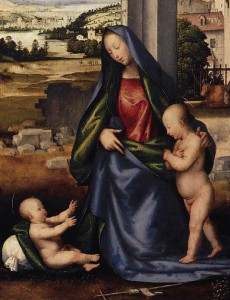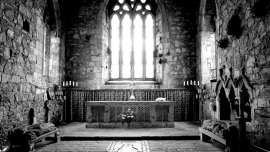He Must Increase
The people in this week’s Gospel are frightened and amazed by the mysterious events surrounding the birth of John.
Only his mother and father, Elizabeth and Zechariah, know what this child will be.
John the Baptist was fashioned in secret, knit by God in his mother’s womb, as we sing in this Sunday’s Psalm. From the womb he was set apart, formed to be God’s servant, as Isaiah declares in this week’s First Reading.
The whole story of John’s birth is thick with Old Testament echoes, especially echoes of the story of Abraham. God appeared to Abraham, promising that his wife would bear him a son; He announced the son’s name and the role Isaac would play in salvation history (see Genesis 17:1, 16, 19).
The same thing happened to Zechariah and Elizabeth. Through his angel, God announced John’s birth to this righteous yet barren couple. He made them call John a special name—and told them the special part John would play in fulfilling His plan for history (see Luke 1:5–17).
As Paul says in today’s Second Reading, John was to herald the fulfillment of all God’s promises to the children of Abraham (Luke 1:55, 73). John was to bring the word of salvation to all the people of Israel. More than that, he was to be a light to the nations—to all those groping in the dark for God.
We often associate John with his fiery preaching (see Matthew 3:7–12). But there was a deep humility at the heart of his mission. Paul alludes to that when he quotes John’s words about not being worthy to unfasten the sandals of Christ’s feet.
John said, “[Christ] must increase. I must decrease” (John 3:30).
We must have that same attitude as we seek to follow Jesus. The repentance John preached was a turning away from sin and selfishness and a turning of our whole hearts to the Father.
We must decrease so that like John we can grow strong in the Spirit, until Christ is made manifest in each of us.
Pope Benedict XVI
Angelus Address, June 24, 2012
Today, 24 June, we are celebrating the Solemnity of St John the Baptist. He is the only saint — with the exception of the Virgin Mary — whose birth the liturgy celebrates and it does so because it is closely connected with the mystery of the Incarnation of the Son of God. In fact, from the time when he was in his mother’s womb John was the precursor of Jesus: the Angel announced to Mary his miraculous conception as a sign that “nothing is impossible to God” (Lk 1:37), six months before the great miracle that brings us salvation, God’s union with man brought about by the Holy Spirit.
The four Gospels place great emphasis on the figure of John the Baptist, the prophet who concludes the Old Testament and inaugurates the New, by identifying Jesus of Nazareth as the Messiah, the Anointed One of the Lord. In fact, Jesus himself was to speak of John in these terms: “This is he of whom it is written ‘Behold I send my messenger before your face, / who shall prepare your way before you. Truly I say to you, among those born of women there has risen no one greater than John the Baptist; yet he who is least in the kingdom of heaven is greater than he!” (Mt 11:10-11).
John’s father, Zechariah — Elizabeth’s husband and a relative of Mary — was a priest of Old Testament worship, he did not immediately believe in the announcement of such an unexpected fatherhood. This is why he was left mute until the day of the circumcision of the child to whom he and his wife gave the name God had indicated to them, that is, John, which means “graced by God”. Inspired by the Holy Spirit, Zechariah spoke thus of his son’s mission: “And you, child, will be called the prophet of the Most High; for you will go before the Lord to prepare his ways, to give knowledge of salvation to his people in the forgiveness of their sins” (Lk 1:76-77).
All this came to pass 30 years later when John began baptizing people in the River Jordan, calling them to prepare themselves with this act of penance for the imminent coming of the Messiah, which God had revealed to them during their wanderings in the desert of Judaea. This is why he was called the “Baptist”, the “Baptizer” (cf. Mt 3:1-6). When one day Jesus himself came from Nazareth to be baptized, John at first refused but then consented; he saw the Holy Spirit settle on Jesus and heard the voice of the heavenly Father proclaiming him his Son (cf. Mt 3:13-17). However, the Baptist’s mission was not yet complete. Shortly afterwards he was also asked to precede Jesus in a violent death: John was beheaded in King Herod’s prison and thus bore a full witness to the Lamb of God who had recognized him and publicly pointed him out beforehand.
Dear friends, the Virgin Mary helped her elderly kinswoman Elizabeth when she was expecting John to bring her pregnancy to completion. May she help all people to follow Jesus, the Christ, the Son of God, whom the Baptist proclaimed with deep humility and prophetic fervour.
Pope Benedict XVI
Angelus Address, June 24, 2007
Today, 24 June, the liturgy invites us to celebrate the Solemnity of the Birth of St John the Baptist, whose life was totally directed to Christ, as was that of Mary, Christ’s Mother.
John the Baptist was the forerunner, the “voice” sent to proclaim the Incarnate Word. Thus, commemorating his birth actually means celebrating Christ, the fulfilment of the promises of all the prophets, among whom the greatest was the Baptist, called to “prepare the way” for the Messiah (cf. Mt 11: 9-10).
All the Gospels introduce the narrative of Jesus’ public life with the account of his baptism by John in the River Jordan. St Luke frames the Baptist’s entrance on the scene in a solemn historical setting.
My book Jesus of Nazareth also begins with the Baptism of Jesus in the Jordan, an event which had enormous echoes in his day. People flocked from Jerusalem and every part of Judea to listen to John the Baptist and have themselves baptized in the river by him, confessing their sins (cf. Mk 1: 5). The baptizing prophet became so famous that many asked themselves whether he was the Messiah. The Evangelist, however, specifically denied this: “I am not the Christ” (Jn 1: 20).
Nevertheless, he was the first “witness” of Jesus, having received instructions from Heaven: “He on whom you see the Spirit descend and remain, this is he who baptizes with the Holy Spirit” (Jn 1: 33). This happened precisely when Jesus, after receiving baptism, emerged from the water: John saw the Spirit descending upon him in the form of a dove. It was then that he “knew” the full reality of Jesus of Nazareth and began to make him “known to Israel” (Jn 1: 31), pointing him out as the Son of God and Redeemer of man: “Behold, the Lamb of God, who takes away the sin of the world!” (Jn 1: 29).
As an authentic prophet, John bore witness to the truth without compromise. He denounced transgressions of God’s commandments, even when it was the powerful who were responsible for them. Thus, when he accused Herod and Herodias of adultery, he paid with his life, sealing with martyrdom his service to Christ who is Truth in person.
Let us invoke his intercession, together with that of Mary Most Holy, so that also in our day the Church will remain ever faithful to Christ and courageously witness to his truth and his love for all.
Byzantine Liturgy
Lucernarium of Great Vespers for the feast of the Nativity of John the Baptist
On this day the great Forerunner comes into the world, issuing from Elizabeth’s barren womb. He is the greatest of the prophets; none other has arisen like him, for he is the lamp who comes directly before the greatest of lights and the voice who goes before the Word. To Christ he leads the Church, his bride, and prepares a chosen people for the Lord, purifying them by water in preparation for the Spirit.
From Zachary this young plant is born, the most beautiful of the sons of the desert, herald of repentance, the one who purifies with water those who have strayed, and who, as forerunner, bears the message of the resurrection even to the dwelling of the dead and intercedes for our souls.
From your mother’s womb, O blessed John, you have been prophet and forerunner of Christ: you leapt for joy on seeing the Queen approaching the servant, bearing before you Him whom, without mother, the Father conceives from all eternity. O you, who were born from a barren woman and an aged man according to the promise of the Lord: beseech him to take pity on our souls.
(Biblical references : Mt 11,11; Jn 5,35; Mt 3,3; Jn 3,29; Lk 1,17; 3,16; Mk 6,28; Lk 1,40; 1,13)
Saint Maximus of Turin
Sermon 99; PL 57, 535
“He must increase, I must decrease” (Jn 3:30)
Rightly indeed can John the Baptist say of the Lord our Savior: “He must increase but I must decrease” (Jn 3:30). The statement is being fulfilled at this very moment: at Christ’s birth the days grow longer, at John’s they grow shorter… When the Savior appears it is clear that the day increases and it declines at the birth of the last of the prophet’s, for it is written: “The Law and the prophets lasted until John” (Lk 16:16). Inevitably the observance of the Law sank in shadow when the grace of the Gospel began to shine. The glory of the New Testament takes the place of the prophecy of the Old…
The evangelist says with regard to our Lord Jesus Christ: “He was the true light who enlightens every man” (Jn 1:9)… It was when the duration of the night was extending over almost the whole of the day that our Lord’s coming suddenly cast all its brightness. If his birth cast out the darkness of humankind’s sins, his coming put an end to night and brought us light and day…
Our Lord says that John is a lamp: “He was a burning and shining lamp” (Jn 5:35). But the light of a lamp pales when the sun shines: its flame dies down, overcome by an even more radiant light. What sensible person uses a lamp in full sunlight?… Who would still come for John’s baptism of repentance (Mk 1:4) when Jesus’ baptism brings salvation?

